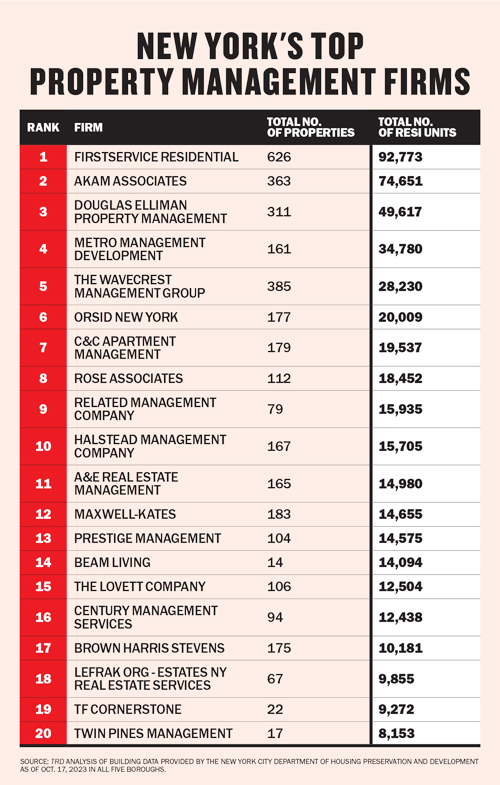This article first appeared in the The Real Deal.
Master managers: Ranking NYC’s top firms of 2023

One year after a narrow margin of victory led to calls for a recount, there is now a clear leader in the competitive world of New York property management.
FirstService Residential vaulted further ahead of its competition this year after acquiring Greenthal & Co., substantially adding to its count of managed condominium, cooperative and rental properties.
The firm ended the year managing 18,000 units more than its closest competitor, AKAM Associates, after beating the number two spot by just seven units last year.
“We remain highly engaged in the M&A arena,” Marc Kotler, president of new development at FirstService, told The Real Deal.
Although the company wins more market share and eats more of the pie, Kotler believes the size of the pie continues to grow, too.
“We still see developers looking to move forward with diverse projects in different segments of the market … that include residential, office, hotel and retail components,” Kotler said in an email.
To rank the city’s top property managers, TRD analyzed the number of units under management using building data from the Department of Housing Preservation and Development from all five boroughs.
The largest four residential property managers, including Douglas Elliman Property Management and Metro Management Development, retained their rankings.
Greenthal was ranked fifth largest last year. Other notable movers include Rose Associates, which rose to eighth place from 12th, and Maxwell-Kates, rising to 12th place from 15th. Century Management Services fell to 16th place from its rank of 11th last year.
The new world
If sustained recovery from the pandemic helped mark 2023, the lasting effects it had on how people find and use residential real estate is also notable.
“Out went the aqua grotto, and in its place went a multi-use, co-working and lounge space,” is how a representative of Rose Associates depicted trends in amenities after the pandemic.
Rose, which manages more than 18,000 rental units, leapfrogged Related Property Management this year. Rose claims to be the city’s largest rental-only management firm.
Virtual technologies that made co-working spaces a must-have in competitive buildings also changed how people find and relate to their living space.
To find apartments, “renters doubled down on their reliance on internet research,” according to Rose, which saw a 25-percent increase in sight-unseen leasing this year and a 75-percent increase in renters leasing after just one visit. “Return visits are a thing of the past.”
For residents used to the ease of digital tools, “there is no one-size-fits-all,” Kotler said, “but overall, residents need easier ways to communicate, request support and receive information.”
At luxury buildings, that can mean restricting access to certain floors, as well as automated leak detection and high-tech elevator systems for super-tall buildings, according to Kotler (proving the stinging power of when owners at 432 Park Avenue exposed alleged construction defects to the New York Times in 2021).
Inclement weather
Not everything, however, is a problem to be overcome by amenities upgrades or investment in new technology.
Higher interest rates, rising construction costs and less favorable regulation — chiefly, the expiry of 421a in June — have crimped the new development pipeline, leaving management firms with fewer opportunities to grow.
In a city where about two-thirds of people rent their apartments, multifamily development has slowed to a virtual standstill, and a new, robust cycle of condo construction has yet to kick off.
A lack of new rental buildings may ultimately harm the management industry as a whole, according to Rose, which relies on rentals for a higher margin business.
“Owner-occupied housing is essentially a break-even enterprise focused on longer term appreciation and quality of life issues rather than profit,” according to a Rose associate.
Co-op and condo buildings tend to have a larger staff because “residents vote for the services they want and aren’t worried about asset performance,” the Rose representative added.
Other hurdles include increased regulation, including Local Law 97, which is meant to reduce greenhouse gas emissions, and a perceived lack of compliance tools for it and other rules.
“Most of the buildings we manage have already started a decarbonization study or are implementing carbon reduction measures,” said Kotler, who faulted “the lack of centralized tracking mechanisms on city agency websites” for making it harder to comply with rules for everything from parking garages to gas pipes and parapets.
With fewer ground-up buildings in the planning stages, “many developers are looking for properties that are right for conversion from commercial to residential because work-from-home is here to stay,” according to Kotler.
One hurdle not likely to trip up the city’s biggest property managers: the rising costs of upkeep coupled with price controls at rent-stabilized buildings. That problem is more likely to fall on the shoulders of smaller landlords, who have fewer resources to cope with adversity.
“We manage buildings with rent-regulated units,” said Kotler. “Margins are not greatly impacted because the regulated units do not make up the entire building.”

